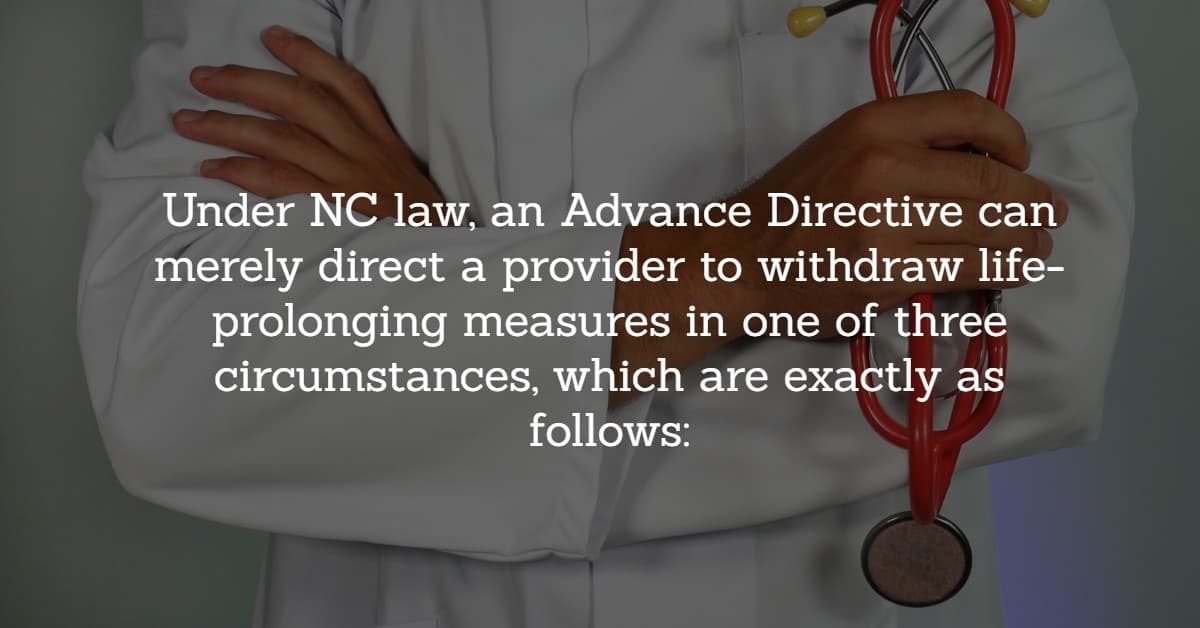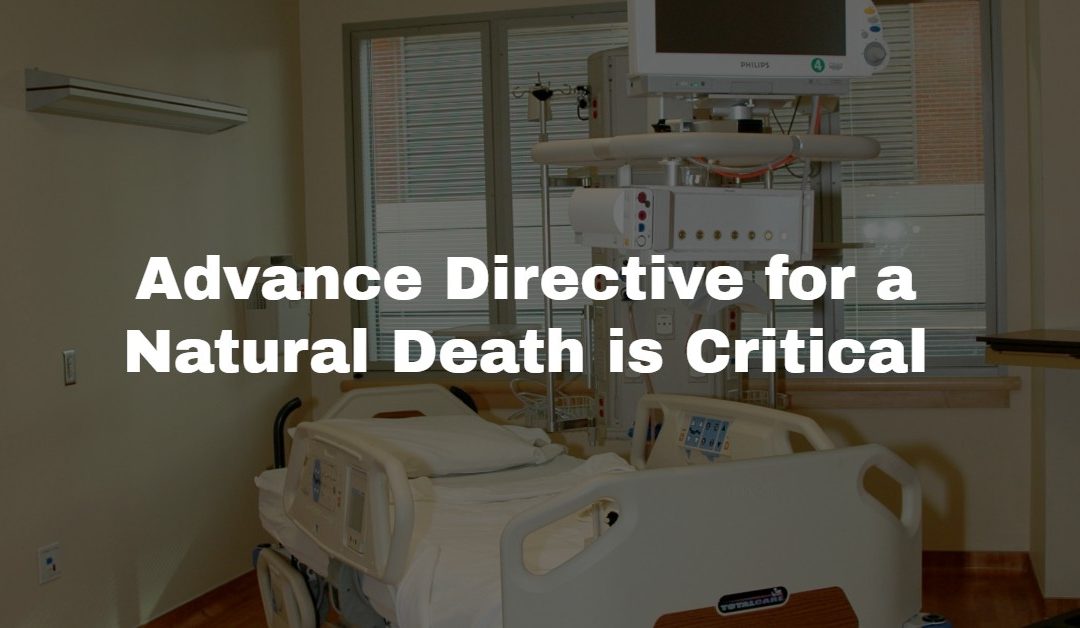So often, people call my office and tell us they just experienced the death of a loved one, but not before they had their life prolonged by artificial measures for a lengthy period of time, far beyond the period of time which might have been appropriate under the circumstances.
The reasons for this vary, but frequently it is because the family is either unsure of what the ill person would want, or the family has very different perspectives on what is appropriate under the circumstances.
One of the observations I have formed over the years when it comes to the process of dying is that people’s perspectives on the subject depend heavily on their previous experiences with death. Because our office is located so close to Research Triangle Park, a lot of young professionals come into our office wanting to get Wills done in response to their move to NC, getting married, having a baby, etc., and I discuss the withdrawal of life prolonging measures with them.
When I compare their perspectives to people that have lived a bit and experienced death among family and friends, their responses to the question of withdrawing life prolonging measures are heavily influenced by such experiences.
For example, if a person’s only exposure to the process of dying is the headlines showing the miracle child waking up from a coma when everyone thought he was brain dead, or the person who was never supposed to recover from a disease but did, or some show about the peculiarities of humanity on the Discovery channel, then when faced with that process for the first time without support, the “exceptions” might become the expectations, and that may hinder the process.
Similarly, if I get someone in my office that has personally observed a miraculous situation, or someone defy a poor prognosis, that becomes the reference point for them for their decisions. However, a lot of people look at withdrawing life prolonging measures as a very real part of the cycle of life and want to ensure it happens as soon as it becomes appropriate.
Putting a group of people in the same room to collectively decide the fate of a person who cannot speak for themselves is a recipe for conflict, and potentially lifelong resentment.
People with such vastly different perspectives on the process of death, all formed by very real things out there in the world, neither necessarily wrong, are going to have a very difficult time coming to a resolution.
An Advance Directive for a Natural Death is Critical
In order to solve such a dilemma, an Advance Directive for a Natural Death is critical. This document is also referred to as a “Living Will”, and while that is a terrible name for what the document accomplishes and confuses a lot of people, you may be asked if you have one the next time you need a minor surgery, and you’ll need to know that the term is synonymous with an Advance Directive.
Contrary to what it may sound like, an Advance Directive is not a death sentence. It’s not assisted suicide. It’s not a direction to end your life. North Carolina (and nearly every other state) does not permit the affirmative act of ending one’s life.
Rather, it is an expression of your desire that when you are finally on death’s doorstep and are in the process of transitioning to whatever awaits us on the other side, and we could or are keeping that from happening using artificial means, even though we aren’t able to reverse whatever put you in that position to begin with, that we should just keep you comfortable, free of pain, clean, and maintain your dignity while the process of death naturally proceeds to its inevitable conclusion.
Often, people will refer to this as a “DNR” and that is not what this is. There are orders out there related in substance to this process. One is a “Do Not Resuscitate” (DNR) order and another is a “Medical Orders for Scope of Treatment” (MOST). I think it’s very important to understand the distinction and relationship of these documents to a Living Will.
Ideally, if you are so sick that you might not want to be resuscitated if it becomes necessary, your doctor would come and speak with you, explain the illness, your prognosis, and your options. After being fully informed of your options, your doctor may enter an order directing the withholding or withdrawal of life prolonging measures (assuming all the prerequisites for such an order have been met).
If possible, this is always better than an alternative, and you should always make your own decisions if you can. However, the practical reality of this process is that it often does not happen that way. A “conversation” simply cannot happen, and there’s where the Living Will steps in. It is like having a conversation in advance.
In the Living Will, you are essentially saying that if your provider makes certain determinations about your medical status, then your wishes are as follows…. and your expression of what you’d want can then be communicated despite the fact that you are unable to make or communicate medical decisions at the time when it is needed.
You are essentially having the “conversation” in advance by having a Living Will. And in response to reviewing that expression of your wishes, the medical provider could enter an order, like a DNR or MOST, which will then direct the person’s care. If for example, you fall ill at home and an ambulance comes. The first responder is not going to withhold treatment because your loved one is waving a Living Will at them.
They are going to stabilize you and get you appropriate medical care. Once under a doctor’s care, then consideration of your wishes will be taken into account and an order may be entered. If that order is entered and you wave that at a first responder, that first responder is going to be able to withhold life prolonging measures in accordance with the order.

1) Incurable or irreversible condition that will result in death within a relatively short period of time;
2) Unconscious and, to a high degree of medical certainty, will never regain consciousness; or
3) Advanced dementia or any other condition resulting in the substantial loss of cognitive ability and that loss, to a high degree of medical certainty, is not reversible.
If one of the foregoing conditions has been met, then withdrawing life prolong measures can be permitted. The signing requirements in NC are somewhat strenuous, and more so than most other states. You will, of course, need to sign the document. It also must be witnessed. The witnesses themselves cannot be related within three degrees of kinship, which includes children, grandchildren, great-grandchildren, parents, siblings, nephews, nieces, grandparents, uncles, aunts, and great-grandparents.
They also cannot be an expected beneficiary or heir to your estate, they cannot be the attending physician, licensed health care providers who are paid employees of the attending physician, paid employees of a health facility in which you are a patient, or paid employees of a nursing home or any adult care home in which you reside, and do not have a claim against any portion of your estate at the time of the declaration. In short, the witnesses need to be disinterested. Finally, the document must be notarized or proved before a clerk or assistant clerk of superior court.

The first thing to keep in mind is that the condition of “advanced dementia or any other condition resulting in the substantial loss of cognitive ability and that loss, to a high degree of medical certainty, is not reversible” is no longer available as an option for withdrawing life prolonging measures, as that option is unique to the person faced with the illness, but the other conditions are within the control of the following, in the order named:
1. A guardian of the patient’s person (unless there’s a health care agent whose authority has not been suspended by the Court). If you are declared incompetent by a court and have a guardian appointed, then the guardian will decide. The only exception to this is if you have a health care power of attorney, and only if the health care power of attorney is not suspended by the Court, which does happen.
2. A health care agent appointed pursuant to a valid health care power of attorney, to the extent of the authority granted.
3. An agent under a different type of power of attorney (under our general POA statute) that has medical authority.
4. The patient’s spouse.
5. A majority of the patient’s reasonably available parents and children who are at least 18 years of age. In my opinion, as discussed above, having people separated by an entire generation that have very different perspectives on the process of dying is a golden opportunity for conflict.
6. A majority of the patient’s reasonably available siblings who are at least 18 years of age.
7. An individual who has an established relationship with the patient, who is acting in good faith on behalf of the patient, and who can reliably convey the patient’s wishes. This is a frightening concept, as it potentially puts your fate in the hands of someone claiming to speak for you.
8. If none of the above is reasonably available then at the discretion of the attending physician the life-prolonging measures may be withheld or discontinued upon the direction and under the supervision of the attending physician.
The applicability of Living Wills in other states is a frequent question I get. Here, a Living Will from another state is valid here as long as it was done correctly in the other state. The practical problem is that your provider may not know the laws of another state, and it may take time to determine that, thus delaying the implementation of your stated wishes. The statutes involving this subject vary widely from state to state, so it’s best to get a Living Will done in the state where you reside.
For example, the witness requirements vary in extremes. Here are the witness requirements from a sampling of states:
• Alaska: No witnesses
• Alabama: Two witness 19 years of age or older
• Iowa: Two witnesses OR a notary
• Utah: One witness
• Massachusetts: Does not officially recognize Living Wills
Is North Carolina’s law of Living Wills perfect? Not in the least. It is full of wiggle room for physicians and hospitals. If following your directive would violate that physician’s conscience or the conscience-based policy of the facility at which the declarant is being treated, then the physician does not have to follow your directive, but cannot interfere with efforts to substitute that attending physician with another or have the person moved to another facility that will follow the directives.
An attending physician is also permitted to decline to follow your advance directive if there are reasonable grounds to question the genuineness or validity of a declaration. How this plays out is no matter what you say in a document, if you have someone in the room jumping up and down proclaiming that no one will interrupt life prolonging measures, then it is unlikely the directive will be followed.
Even in such a circumstance, however, there will be a fair amount of non-legal leverage that can be used to help get that person to a place where your wishes may be followed. Despite the wiggle room which might exist in our current version of the laws, it is prudent and helpful to have an advance directive which clearly articulates your wishes about the subject so that your family and providers can involve you in the “conversation” about your care, even if you aren’t able to make your communicate your wishes at the moment it becomes relevant.
The estate planning team at Hopler, Wilms & Hanna prepare dozens of living wills each week for people in the Triangle and Sandhills regions of North Carolina. If you have a desire to make your wishes known about your end of life care, please reach out to us, and we will make sure your wishes are known in a manner consistent with North Carolina


